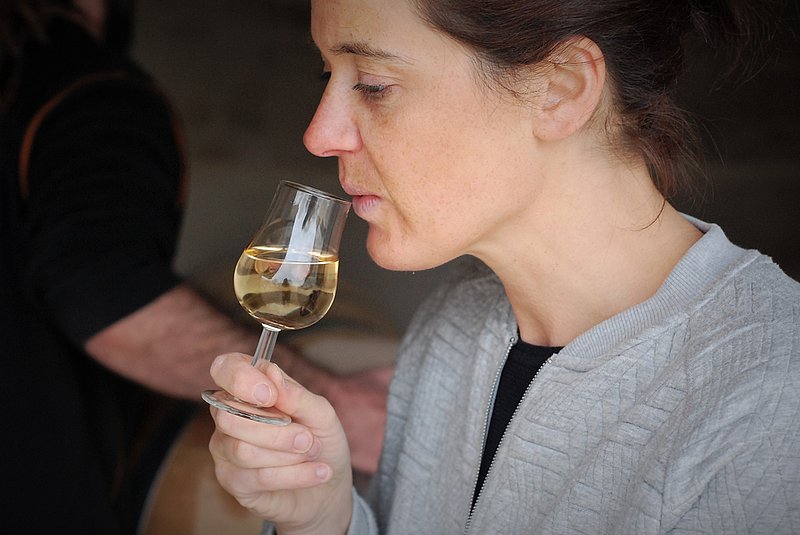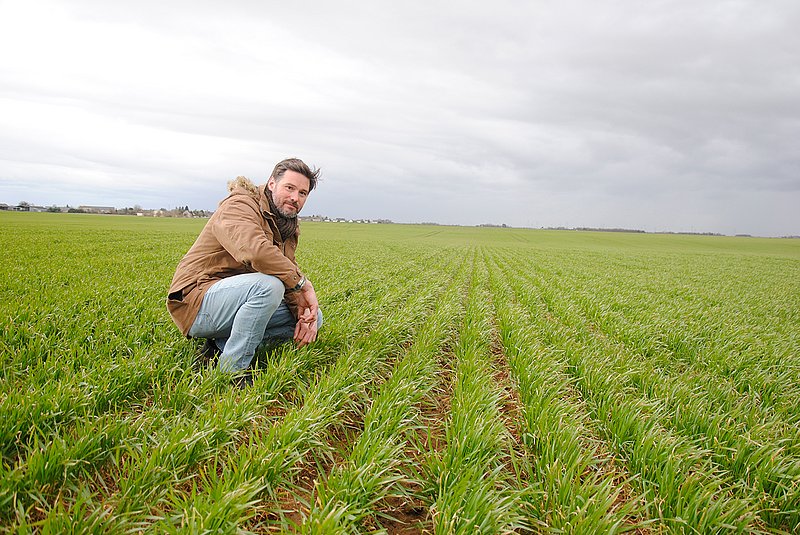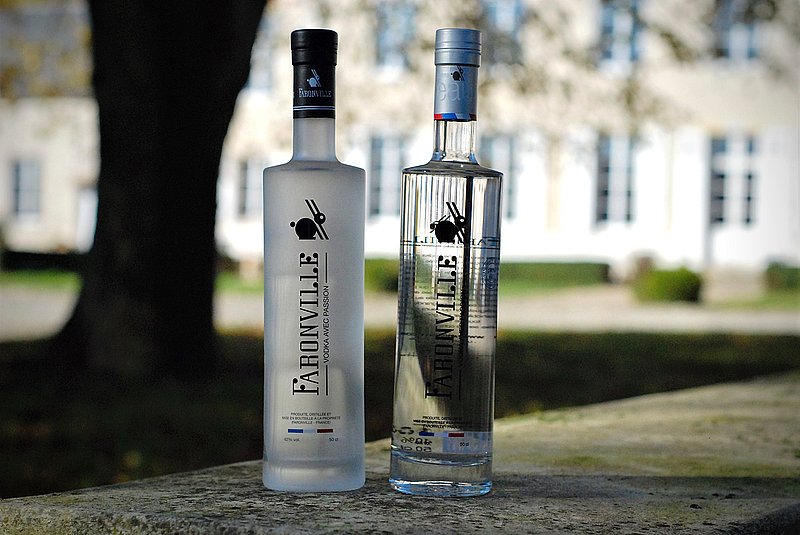
A new spirit
Pauline and Paul-Henri Leluc originally come from the commercial and journalistic sector. 14 years ago, however, they switched back to farming. They did not only go for complex but also for rather particular products. For example vodka. terraHORSCH talked to the two dreamers who cannot be dissuaded from their adventure.
The family history, the continuity of the farm and the desire to give their children a fulfilled life – these were the reasons why, in 2007, Paul-Henri Leluc took over his grandfather’s farm in the region Beauce in France. “For me, the return to Faronville is the return to a way of life which gets us closer to our roots again. And it allows for giving our children what we want most for them: live on a farm, have a fulfilling job, do something useful, but first and foremost create something that will last – not only in our fields, but also among society. Our farm is more than just a professional project. It is about holistic thinking and global balance.”
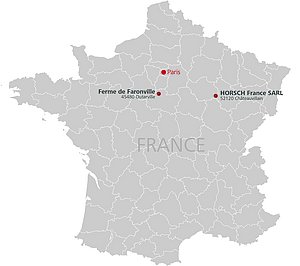
Paul-Henri Leluc attaches great importance to interpersonal relationships – with his employees and apprentices and with his customers. Moreover, his curiosity pushes him and motivates him to develop things further.
Extension of the rotation
For many years rotation had been very tight. It consisted of wheat, sugarbeet and spring barley. The main crop were beets. They were cultivated every three years, sometimes even every two years. Diseases developed and, moreover, yields decreased significantly. Click beetles respectively wireworms and rhizoctonia caused serious damages. In addition, they had problems with lamb’s quarters so they had to make five passes with herbicides to fight them. But they still did not manage to keep the fields clean. When the sugarbeet quota finished, Paul-Henri Leluc finally realised that it was time for a new strategy for the future: “The basic conditions for farming are changing constantly and we have to adapt.”
So he started to introduce another rotation and at the same time to reduce tillage. “I had several objectives: to reduce weed and pest pressure, to save costs, to restructure my soils, to supply nutrients and to abandon the cultivation of sugarbeets. The latter because there were too many risks. I started with a rotation consisting of wheat, barley, potatoes, wheat, wheat, barley and maize. I always integrated catch crops. To stimulate the formation of humus I sowed a mixture of phacelia, mustard, sunflowers, field beans and radish after each harvest. This mixture digests the straw, due to the multiple roots guarantees a better structure of the soil and after the straw has been turned supplies the soil and the following crop with nutrients. The advantage are the low costs that amount to about 55 €/ha.
My approach is geared to the highest possible benefit but also depends heavily on the weather forecast. The objective always is to optimise yields and the nutrient management. For example I would never sow wheat after wheat if the catch crop did not develop properly.”
Appropriate machines
“Our Avatar 12 SD is optimally in line with our strategy of conservation tillage. This seed drill is less expensive per meter working width than the 8 meter version, it can sow at a row width of 25 cm and the sowing density can be reduced to 300-350 grains/m² to lower the disease pressure for hard wheat. It even is more manoeuvrable than the 8 meters machine. If my calculation does not add up, the resale value is safe anyway. I finally do not take any risk when buying this machine: If it works, I keep it. If it doesn’t work, I can sell it without a significant loss in value.
As the disc and the tine direct seed drills complement each other, we also use a HORSCH Sprinter 8 CO with narrow points for sowing catch crops into straw in spring. These seed drills are an important part of our strategy to save time. They also help to increase the cultivation quality in the potato fields and for the production of the spirits. Though the contribution margin for potatoes is higher than for wheat, the risk of conservation farming is too high. The contact of the straw with the skin causes diseases.” Maize is sown with the StripTill method.
Fundamental changes
Paul-Henri Leluc worked conventionally for one year, but he quickly realised that he only went round in circles. He started to push the sale of potatoes. “A neighbour offered me a hectare contract, but I declined. I preferred to produce my potatoes myself and then resell them.” One year later, when he had understood how the system worked he invested in a building for storage and processing and started to market his products. First in Rungis, the largest wholesale market in France, Then in Italy, Spain and Portugal. To generate more margin, he sorts the potatoes. “This way I make sure that 95 % of the delivered goods are paid for – without losses because of adhering soil or non-conforme size.”
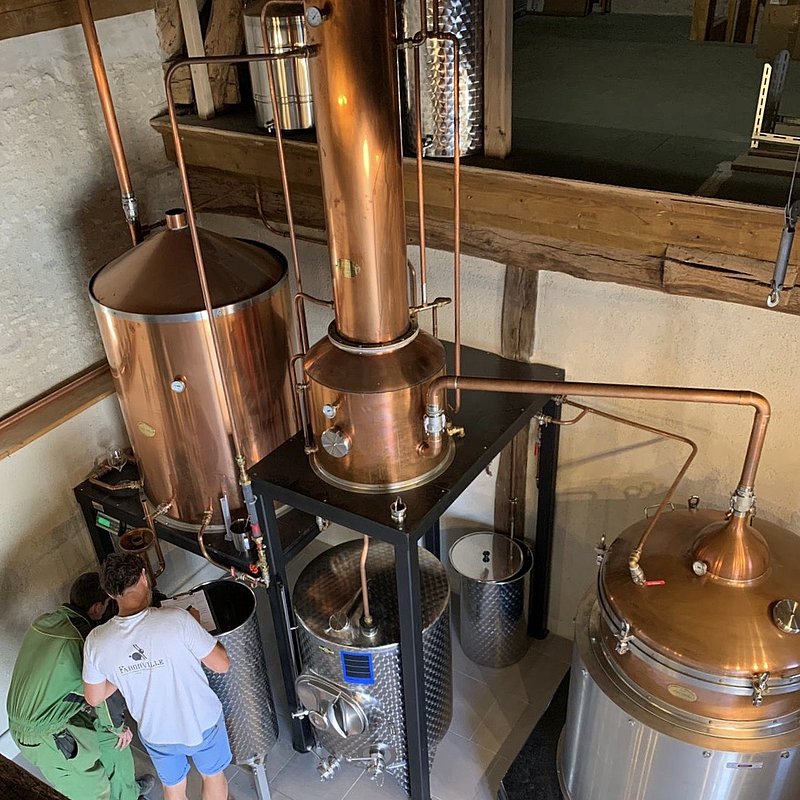
Business was good, but Paul-Henri Leluc needed a new challenge. “I always need new projects. I love when there is real action on a farm. I always had the picture in mind of farms or vineyards full of hustle and bustle.“
The trigger finally was a trip to Finland organised by Valtra. The group visited a distillery and took part in a vodka tasting. “I have always been a fan of Scotch whisky. I had never been particularly interested in vodka so far. But it changed completely. I saw the potential for our farm. Vodka based on potatoes was perfectly in line with our model.”
The end of the sugarbeet quota would have required a payment of 140,000 € for the production rights. But why pay when profitability was plummeting anyway? The money could be invested better in other, more profitable projects. So Paul-Henri Leluc took the risk. He set up a business plan based on his enthusiasm for spirits and the bank supported his bold plan. He bought a distillator and set it up at the farm in Faronville. “It was an investment into the future: Vodka is not really part of the drinking culture in France and the market is in the hands of some few producers. It is a closed circle and you have to figure out everything yourself.”
But Paul-Henri Leluc’s knowledge does not come from a handbook of chemistry: “I took courses at the destillery Ergaster in Noyon in the department Oise. The method to liquefy the potatoes is essential. And, of course, you have to find the ideal variety with regard to taste and consistency. I made a lot of tests regarding filtration. Yeast virtually is the magic ingredient that turns sugar into alcohol. Depending on whether the transformation process proceeds more or less fast, the taste is completely different. Maturation and the storage in the bottle also influence quality considerably.”
Beyond the production process quite a lot of steps were necessary with the authorities – with customs and with the competition, consumer protection and anti-fraud office. The production of alcohol is rigorously controlled. “This is what brought me back down to earth“, Paul-Henri Leluc admits. “But from the moment I bought the distillator there was no turning back.”
Another spirit
Because of the price volatility for cereals and the high costs for purchasing land many farmers try to increase their margins by reducing production costs. Paul-Henri Leluc does not agree: “In terms of reduction of expenses we have already reached the floor. We could perhaps save another 25 to 30 €, but in the future we want to focus on increasing the turnover per hectare“, he explains. “Today our turnover amounts to 1.5 million € for our 260 hectares.“
So the innovations - considering all business sectors – are quite profitable. But it still is difficult to put them all into practice. “I talk to other farmer about conservation farming and about the reduction of plant protection agents, but not about the most innovative part of my project, the distillery. Everyone keeps his cards close to his chest as I am a competitor. I read a lot and I intensely dealt with a lot of topics. But first and foremost I believed in myself and in my project. With this project I can self-actualise. And it confirms my decision to farm differently. Of course, it hurts if you do not get any support or if you realise that others have doubts about what you yourself are so convinced of. But the satisfaction and the pride you feel make up for it.”
Marketing is important
In farming, too, marketing is very important. Paul-Henri’s wife Pauline is in charge of this sector – as well as of sales and all administrative issues: “I understand marketing as a communication tool which conveys authenticity to the customer. Beautiful pictures and the staging of everyday life does not contradict honesty. Every farmer can make honest marketing. He doesn’t sell illusions, but reality! This is why we want to advertise the hashtag #venezvérifier (= “come and see for yourself”) in the social networks.
The stories we tell show that we are happy to welcome the consumers on our premises. This is the most significant feeling you can convey! You must never lie. This is why we also talk about plant protection agents. 50 % of our customers ask about them anyway. So we notice that it is a very important topic for them.”
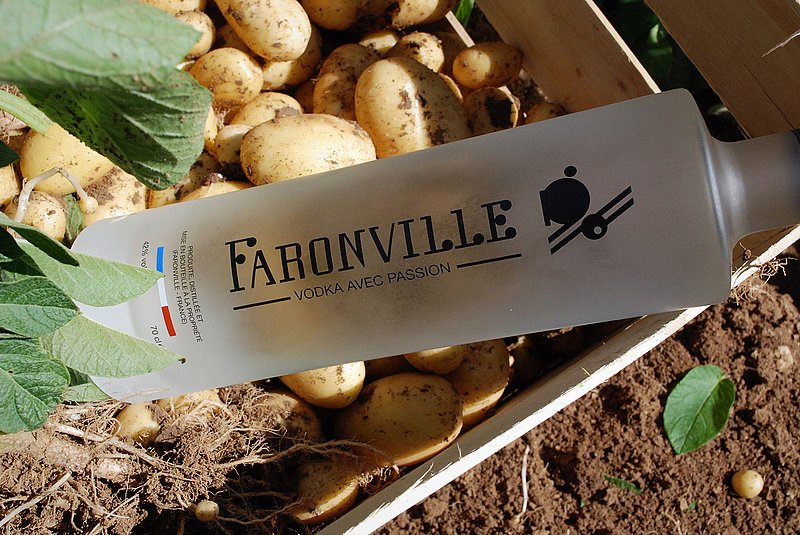
Farmers work in the primary sector and it took some time till the Lelucs were familiar with the median Instagram. Le Monde, L’Express and Le Point got to know the farm via the social networks. So you should not underestimate them! These connections lead to contacts that can develop into friendships and then to opening up to others.
Beyond the staging of the life of a farmer respectively producer, they also had to think about the packaging and about how to present the products and the work on the farms in pictures: to inspire to dream and not be dissuaded from these dreams. “For us it is important to create an authentic marketing to last and thus to create a real history. I decided to give our product and our farm a soul. If eventually in 200 years there is photo of us in the distillery and our umpteenth grandchild runs the farm, I would be incredibly proud.“
Last but not least
Paul-Henri and Pauline Leluc are farmers, producers and they are inventive. Altough their world does not exclusively revolve around the farm. Their economic activities are centred about what is most important for them: their children. “We want to show them that a global balance is possible: job and family, financial success and farming, creation of jobs and living in the country, environment and productivity. With regard to the last point, we carried out a lot of tests and are involved in Global G.A.P., a worldwide association for encouraging Good Agricultural Practice (G.A.P.), and the label HVE (Haute Valeur Environnementale = high ecological value).
Finally Paul-Henri Leluc points out: “What I want to pass on to the readers of terraHORSCH is: You must not limit yourself to one way and cling to it at all costs. Every mistake is a chance to develop further. Listen to the consumers, watch what the neighbours do, get inspiration from professional colleagues from abroad – this is important to keep an open mind. The agricultural world changes to such an extent that it would be unrealistic to believe that you will be able to work with the same methods the rest of your life. I am also open to organic farming and I will continue to pull out different stops to make my farming strategies successful.”
